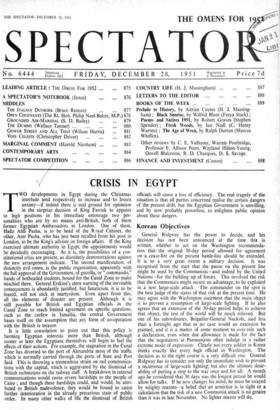Korean Objectives
General Ridgway has the power to decide, and his decision has not been announced at the time this is written, whether to aot on the Washington recommenda- tion that the original 30-day period allowed for agreement on a cease-fire on the present battle-line should be extended. It is to a very great extent a military decision. It was recognised from the start that the pause on the present line might be used by the Communists—and indeed by the United Nations—for the building up of forces. This involved the risk that the Communists might secure an advantage, to be exploited in a new large-scale attack. The commander on the spot is the best judge of the status of that risk at the present time. He may agree with the Washington statement that the main object is to prevent a resumption of large-scale fighting. If he also agrees that an extension of the 30-day period helps to achieve that object, the rest of the world will be much relieved. But one bf his subordinates, Brigadier-General Nuckols, said less than a fortnight ago that in no case would an extension be granted, and it is a matter of some moment to over-ride such a declaration, even when due allowance is made for the fact that the negotiators at Panmunjom often indulge in a rather extreme mode of expression. Clearly not every soldier in Korea thinks exactly like every high official in Washington. The decision as to the right course is a very difficult one. General Ridgway has to consider not only the immediate wish to prevent a recurrence of large-scale fighting: but also the ultimate desir- ability of putting a stop to the war once and for all. A month ago he considered that 30 days was the longest period he would allow\ for talks. If he now changes his mind, he must be swayed by weighty reasons—a belief that an armistice is in sight or a calculation that the risk of a new Communist attack is no greater than it was in late November. No lighter reason will do.






























